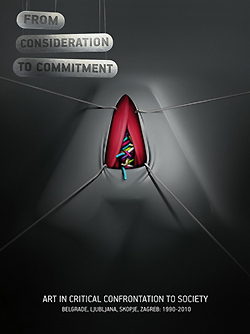From Consideration to Commitment: Art in Critical Confrontation to Society (Belgrade, Ljubljana, Skopje, Zagreb: 1990-2010) (2011) [multiling]
Filed under book | Tags: · 1990s, 2000s, art, art criticism, contemporary art, croatia, ex-yugoslavia, macedonia, serbia, slovenia, video art

The publication explores practices of critical contemporary fine arts – practices of research, progressive and experimental actions by contemporary fine artists from the 1990s to the present, in four countries in the region – Croatia, Macedonia, Serbia and Slovenia. These are practices which focus on issues such as identity aspects (national, cultural, religious, ethnic), workers’ rights, social integration of minorities, global market fluctuation trends and its impact in the local context, unscrupulousness of capital, the position of women, spatial devastation, art institution system issues, and many others.
The publication maps out and theoretically reviews critical and research practices, and contemporary fine arts practices oriented towards the contemporary civilization moment, which have been active in the context of the independent cultural scene since the 1990s, but which have also been present in the institutional frame. The authors provide only drafts of the political, social, economic and cultural changes of the local contexts, through four segments, due to a lack of space. Each segment focuses on the practices and context of a given country, i.e. the capital as the primary focus, and in addition to the introductory word by the authors, it includes interviews (with authors, theorists, curators, organizers…) who contribute to the recording of these artistic practices based on their experience, work and knowledge.
The segments deal with the Belgrade, Ljubljana, Skopje, and Zagreb scenes. All the authors devised their approaches in an effort to present the fruitful and creative production of these cities, to the greatest extent possible.
Contemporary visual art is discussed through the works and experiences of Igor Grubić, Sanja Iveković, Andreja Kulunčić and Darko Šimičić (Croatia), Stevan Vuković, Milica Tomić, Danilo Prnjat and Živko Grozdanić Gera (Serbia), Neven Korda, Marko Peljhan, Marija Mojca Pungerčar and Maja Smrekar (Slovenia), and Bojan Ivanov, Zoran Poposki, Mira Gakina and Žaneta Vangeli (Macedonia).
The book was conceived as a multilingual publication in English, in addition to the local languages (Croatia, Macedonian, Serbian and Slovenian).
Realized as part of the project Let’s Talk Critic Arts.
Editorial Board: Dušan Dovč, Vesna Milosavljević, Jasna Soptrajanova and Dea Vidović
Authors: Jasna Jakšić – in cooperation with Tihana Bertek, Maja Gujinović, Ana Kovačić, Srđan Latreza, Petra Novak, Tina Novak, Tamara Sertić and Leda Sutlović (Croatia); Nebojša Vilić (Macedonia); Miha Colner and Nika Grabar (Slovenia); Vesna Tašić – in cooperation with Vesna Milosavljević and Miroljub Marjanović (Serbia)
Publishers: SEEcult.org in cooperation with ForumSkopje; Kurziv – Platform for Matters of Culture, Media and Society; SCCA, Center for Contemporary Arts – Ljubljana / Artservis; The Association of NGOs Clubture
Published in April 2011, Belgrade, Ljubljana, Zagreb, Skopje
611 pages
This work is made available by the Creative Commons Licence Attribution-NonCommercial-ShareAlike 3.0 Unported unless not stated differently.
Alain Joxe: Empire of Disorder (2002)
Filed under book | Tags: · balkans, chechnya, democracy, economy, empire, fascism, globalisation, kosovo, military, neoliberalism, philosophy, politics, serbia, sovereignty, strategy, violence, war, yugoslavia

“Globalization is quickly turning the world into a chaos, leading to an increasing disparity between rich and poor, the rise of an international, rootless ‘noble class,’ and an escalating number of endless cruel little wars. Yet the United States refuses to conquer the world and assume the protective imperial role for the societies it subjugates. Instead, it operates on a case-by-case basis, regulating disorder, repressing the symptoms of despair instead of attacking its cause. For the first time perhaps, humanity has embarked on an ocean of disorder with no final order in sight.”
Translated by Ames Hodges
Edited by Sylvère Lotringer
Publisher Semiotext(e), 2002
Active Agents series
ISBN 1584350164, 9781584350163
221 pages
PDF (updated on 2012-7-26)
Comment (0)Oliver Ressler: Alternative Economics, Alternative Societies (2005)
Filed under catalogue | Tags: · capitalism, economics, politics, serbia, society, utopia

The exhibition “Alternative Economics, Alternative Societies” focuses on diverse concepts and models for alternative economies and societies, which all have in common a rejection of the capitalist system of rule. In the specific context of Serbia and Montenegro, which is facing one of the most “painful” processes of transition and “predatory” capitalism implementation in the region, this art exhibition by Oliver Ressler offers solutions and examples of concrete models of political and social organizing realized in different parts of the world and in different historical epochs. In the context of extremely right-wing politics in Serbia and these incredibly fast economic transformation processes, there is a conviction that the exhibitions have the potential to appeal on questioning and rethinking the local system of rule and to create the bases for thinking about social and economic alternatives.
Contributions by kuda.org, Kristian Lukić, Marina Gržinić, Oliver Ressler, Brian Holmes
Editor: New Media Center_kuda.org
Publisher: Revolver – Archiv für aktuelle Kunst, Frankfurt, Germany, 2005
ISBN 3-86588-123-8
36 pages
All texts are published under Creative Commons Attribution-NonCommercial-ShareAlike 2.0 license unless otherwise indicated.

